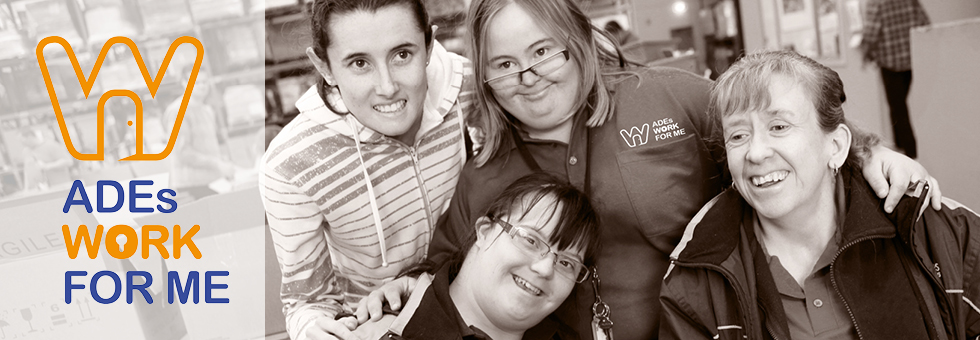Our daughter Sophie works in the Sunnyfield ADE at Chatswood in Sydney. She loves her hours working there because of the social contacts with her friends & carers but she does not have the skills to work in open employment. She has no concept regarding her hourly pay rate which for her is totally irrelevant. We are aware of the financial difficulties that Sunnyfield has, with respect to currently maintaining the supported employment, as no NFP organisation can afford to run any enterprise at a loss. If pay rates are legislated to increase significantly, Sunnyfield will have to close the doors of the workshop & this will be devastating for people with intellectually disabilities. For by far the majority of workers, IT'S NOT ABOUT THE MONEY. It's reassuring that there are people in the community who wish to pay higher rates for workers in ADE's. However,we believe that they do not understand the full ramifications of such legislation which will result in closure of workshops along with reduced social opportunities & feelings of self-worth.
John Carter
My son Dean is now 36 years of age. He has an Intellectual Disability, Epilepsy and some challenging behaviour issues. He also has some autistic features as well as multiple difficulties in so many areas of his life. Dean attended a special school for his high school years. They were good years. When he was 13 years of age, he left there and went to a Sheltered Workshop nearby. Many of his old school friends went there too. It was a happy, safe & secure transition for these PWIDs. The staff there were focused on keeping everyone happy and also keeping the workshop running. Sometimes family members would come in and help if there was a lot to do. This was a choice. The Manager was a good friend and authority figure to the staff and the workers. When there were problems with behaviours, they were handled together by the staff and the families. This workshop rolled along and everyone was pretty happy. Dean also met a lot of new people and he was pretty happy to be there. As were his family. He was doing something worthwhile and he was extremely proud of himself. He learnt so much and was among friends. When the management at the workshop changed, he moved to another sheltered workshop nearby.
He met some new people and found some old friends there too. The management there were also thoughtful and happy to work in with the workers to enrich their lives and run a business too. After a few years, one of the workers at this workshop put ideas into Dean’s head about finding work in open employment. Dean then decided that he wanted to pursue this. So Dean left the friendship, safety and security of his sheltered workshop. Although he had left, he still called in there and expected to be welcomed, but they were all pretty busy doing their work. He could have a chat with them at lunchtime, but that did not always work out. He caused some havoc and we were often called in to help sort things out. He obviously missed everyone. But he did not want to go back because this other idea about open employment was firmly fixed in his head. Over a period of about 2 years after leaving the sheltered workshop, Dean intermittently attended the offices of an organization that purported to find him open employment (it took us about a year to find one that would even take him on) but this was a very bad time for Dean and his behaviours suffered. He had no real place to belong. His workplace had filled such an important place in his life.
The Open employment service provider eventually found him a short course on car detailing but there were ongoing issues there too, he attended some of the classes but also absconded and had to be located by police and we all hoped that he would not have a seizure whilst he was lost. The Open employment service provider also assessed him for work ability at this time and found that he had lost his skills. He had regressed. This devastated him and he was angry and sad at once. He knew his life was not good but he did not know what to do. Further to that, he would not listen to those who tried to help him. Dean became very depressed. He visited his specialists more and his medication was increased and changed in an effort to help him cope with the huge hole in his life. His Grand Mal Seizures were more frequent and we were beside ourselves with worry over him. His behaviours became unmanageable. He was a lost soul and it broke our hearts. He was in crisis. In order to save Dean’s life, We were forced to relinquish his care on 27 February 2009. Below is a small excerpt from the letter we sent to the department of Ageing and Disability Services at this time: ‘Dean is putting himself in danger & is constantly at risk in the community as well as at home. He has been seen crossing roads with no thought of danger. He goes out and walks the street often at night. He will not tell us where he is or what he is doing. He is becoming more and more secretive. His behaviour is reckless and he is a danger to himself. Dean is finding it increasingly difficult to have a conversation.
Ever since he left his workplace, he has been regressing. He cannot think of words to use, so he makes up silly phrases to try to make you laugh, He wants friends but is losing all his skills and this also distresses him as well as those around him. He needs an environment with structure. He is spiraling out of control with his sleeping habits. He stays up till 3Am most nights and sleeps in during the day (or has seizures, how can we tell?) He plays loud music or videos through the night and no-one can sleep well with the noise and the fear for Dean as well as for ourselves with the house wide open all night. He looks haggard. We have no idea when he is having seizures unless we happen to hear him in his room struggling for breath at 10.30AM or thereabouts and we rush in to pull the blankets away from his mouth so that he can eventually breathe after his seizure has already started to turn him blue. His eating habits are all wrong too, but we cannot control him at midnight or whenever he goes to the kitchen. He has an idea of good food, but eats not so good food too. He is gaining more and more weight and his health is in jeopardy. He refuses to shower or brush his teeth with any regularity.
His health is deteriorating. His skin is peeling off. We simply cannot negotiate nor force him to bathe. We could in the past, but not anymore. He is unrelenting in his belief that he can in fact do whatever he wants. He truly believes he is right He will not let anyone tell him what to do. He is not happy’ So, having read this we are sure you will understand just how important it was for Dean to be in a sheltered workshop. Without it we had trouble keeping him alive. Whilst he was alive, he had no quality of life. To this day, he still has a reduced quality of life. After trying for 4 years, I still cannot increase his day program funding. He only has 8 hours per week. That is not enough, he has nothing in his life to look forwards too! We are still having ongoing issues with his behaviour. He is in a group home with 3 other men. Only one has recently found a position in a sheltered workshop and that has changed his life. He has Intellectual disabilities and is Bi Polar. Before he went to the Sheltered Workshop he was also depressed and either fighting or sleeping all day. The police were called to the house almost every week. Now he is happy and cannot wait to go to work.
The violence has stopped. How good is that? Please, please do not take away the access to sheltered workshops. Every parent I know agrees that it is not about the wages they earn, but it is about the fact that they have a place to go, a place to belong where they are able to work together with friends and make a difference. They can walk away at the end of a day and say I have worked hard and I am happy with what I have done. My Manager is happy with me too and I cannot wait to go back tomorrow to do it again. Not only that, but I will see my friends and share stories and possibly lunch.
Life is good… If wages are put up then the ADEs will close and these wonderful opportunities will dry up. This cannot happen. Our Precious children deserve better. Lynette Allen Mother of Dean Allen and Advocate for many other PWIDs
Lynette Allen
My son Daniel has a severe intellectual disability. He has the cognitive age of a two or three year old. He has no literacy or numeracy but he is strong, fit and willing. He values his job at Bedford, Silverwater, above everything else in his life. It gives purpose and fulfillment to his life and it provides his identity. In fact, unlike the rest of us, he prefers the days he goes to work to those he stays at home. He is a highly valued member of the team at Bedford. We are told that Daniel has to be asked to stop work for morning tea or lunch, so eager is he to complete his tasks. He packs and unpacks containers, pushes around pallets, stacks goods and loves every minute of it. He comes home hungry, dirty and completely satisfied with himself. I think it is awesome that someone of his capacity can be a contributing member of our society and I am grateful to the ADE and the Australia Government for making it possible. Why would anyone want to tear down something so useful? The money is irrelevant - Daniel thinks the coins are more important than the notes, anyway. For him, the self-esteem and the job satisfaction are priceless.
Estelle Shields
Please I want to stay and I want to learn. This is my speech that I want to say I love this workshop with all my heart and I like the staff and Arthur, Nell and David. Please with all my love that I want to stay here this is where I belong to the workshop with all my friends and this is my life and our dream to open this workshop forever and I will fight for it. It is my feelings for this place and my love will shine in your heart in you to show you how we care for this place that much and this is Business. We also learn to do our work. Please I want to stay because I want to learn more work skills, I am begging you please give me the chance to stay on and listen to your heart and what did it does say to you, because reach down into your feelings and please don't let us down it's my workshop story. I love this workshop it means a lot to me and will fight for it. I hope this get to you in your heart. I worked so hard to the bone almost and that's the way we work. We work as a team. Team sticks together we are the super workers here we had our right to be at work and that's the whole idea. We are the super workers and here we stay.Please I am begging you I want to stay at my workshop to be with my friends it means a lot to me the most.
Cathy de Vos
Who wants to go back to the "Good old Days" when people with a disability were kept at home or in institutions, locked away never to be seen. Our son who has Downs Syndrome has worked for Endeavour Industries and its predecessors for 20 years. He talks about work to other people and is proud that he is congratulated for working for 20 years. The most important aspect is that it gives him dignity and a sense of self worth. To say that a living wage is warranted is a nonsense. Leave everything as it is, it is all our kids want..
Geoff Dexter
Supported employee Ben Delaney is proving a star performer in applying stickers to pet food packaging as part of a Glenray Manufacturing labelling contract for Nestle Purina Pet Care. Glenray Manufacturing Business Manager Jeff Pawsey said: “We’ve been keeping a tally on how many labels our supported employees are applying to help promote team work and a bit of competition in our crew,” said Jeff. One day recently Ben applied 1,000, a great effort considering his team’s collective effort was 5,400. Ben said: “I just love doing the stickers. It’s so good. It gives me something to do.” Labelling and stickering is important work for an Australian disability enterprise such as Glenray Manufacturing. Jeff said: “It brings out some untapped potential in some of our individuals. The results have been astounding as people who have had difficulty at the start have risen to the challenge,” said Jeff. “The tasks promote teamwork among the crew. It’s very engaging for them, they are personally accountable for their efforts and high performers are rewarded,” he said. Ben and the team are notching about 12,000 labels a week – adding ‘10kg value’ stickers to a new line of Nestle Purina Pet care Supercoat dog food.
Ben Delaney
My wife and I are the parents of a thirty nine year old Downs Syndrome daughter. We have lived at Orange NSW all our daughters life and beyond. Our daughter attended the local special school and went onto employment at Wangarang Industries Orange and has been there for over twenty years. She has been very successful at Wangarang doing a variety of different jobs and we have been pleased that she has been gainfully employed and occupied. As a result she interacts with many people and has developed into a very capable lady. Her capabilities include winning medals at the Special Olympics in Perth some years ago and as a result of her achievements she was nominated and chosen to carry the Olympic torch in Orange for the 2000 Olympic Games. She became an ambassador for disabled people not only in Orange but where ever she touched base. We now fear that employment and occupation for the disabled is being threatened by a government policy and it's ongoing effects that has been set up by people who have little or no knowledge of the disabled requirements in our Country. And I might add just don't care. We fear for our daughter and other disabled people that they will be cast out onto the streets and fall into this countries declining social standards.
We in Orange have already seen a person who was not cared for as a result of the unwanted Richmond Report who roamed the streets and became the laughing stock for many of the community. That person was rumoured to have been taken advantage of sexually. Fortunately the person has been rescued and now attends Wangarang and is a a person changed to far better things. Has this affluent country Australia lost sight of the need for our disabled people in favour of spending enormous amounts of money on those who are already driven by greed and have no regard for people who are contributing in their own way to supporting themselves. J R Hawkey
John & Bev Hawkey
I have worked on the field of Disabilities sine the early 1970s There have been many changes over that period of time for people with a disability One of the biggest changes was to introduce shelter workshops where People were given the opportunity to be trained in areas of the workplace suited to meet with there disability. This gives this person a sense of being Important and a feeling of self worth, a job they feel responsible for and Love doing. If these places had to be closed down to the high wage rise That could be implemented These people would find it hard to cope, with not having a job. We need these work outlets for our people, Where else and who else could teach such skills, these outlets shut down we will end up seeing a massive increase for funding for staff needed to be on hand To care for these people especially the ones who live in group homes.










